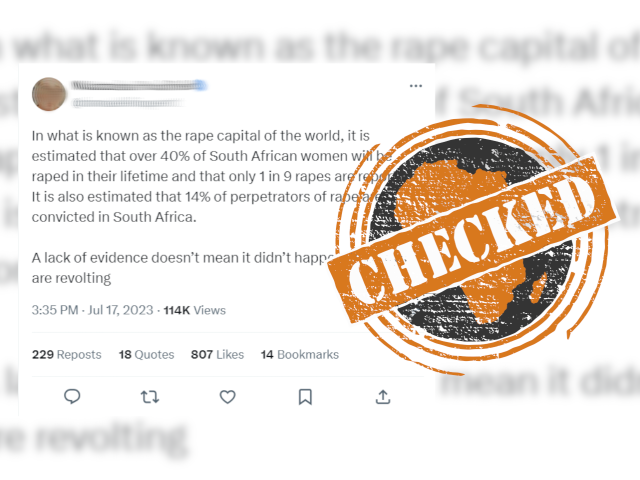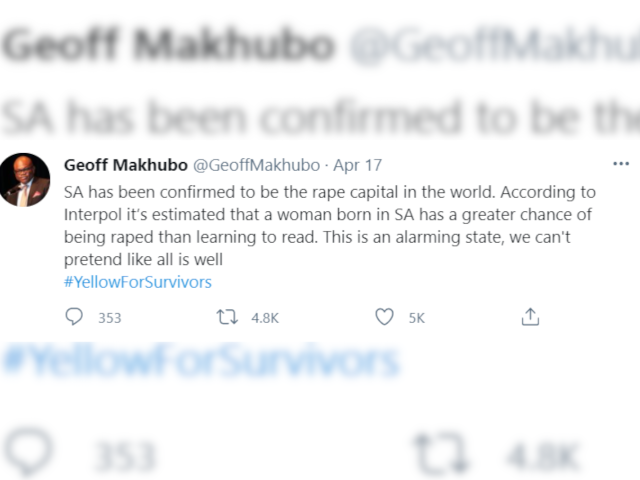My top 3 reports of 2016: Poor whites, blunders about Africa & rape stats
The last year has been a blur of fact-checks, guides, factsheets and spot checks. I’ve spent twelve months scanning the news for claims and double checking statistics. I’m approaching 365 days of hearing “facts” reported on new bulletins and pausing to think “is that true”?
You can’t leave fact-checking at the office when you go home at the end of the day. It changes how you view the world. Your ears perk at statements that would have previously passed without notice. You fight (more regularly) with family members and friends. You unfriend and unfollow people.
In 2016, I fact-checked a number of claims ranging from President Jacob Zuma’s previous state of the nation promises to claims about how many African girls miss school because of their period.
In this blog, I look back at three fact-checks this year that I consider my top ones.
 In February, the UK’s Mail Online documented the “squalid conditions” of South Africa’s “white squatter camps”. A picture spread showed residents of Munsieville, a white squatter camp in Gauteng. These white people, the website claimed, were part of the “more than 400,000 white South Africans [who] are thought to live in poverty”.
In February, the UK’s Mail Online documented the “squalid conditions” of South Africa’s “white squatter camps”. A picture spread showed residents of Munsieville, a white squatter camp in Gauteng. These white people, the website claimed, were part of the “more than 400,000 white South Africans [who] are thought to live in poverty”.
The journalist and editor did not respond to my emails asking for the source of the claim. Without this information I looked for the most recent information on poverty levels in South Africa.
South Africa’s 2010/2011 Income and Expenditure Survey held the answer. It showed that just 42,115 white South Africans were estimated to live below the national poverty line of R779 per person per month (in March 2011 prices). This was equal to 0.9% of the white population. This was the lowest of all race groups.
Some researchers think that this poverty line is too low. However, even a higher poverty line of R1,042 per month didn’t produce a figure close to 400,000 white people. Using that poverty line an estimated 82,573 white people lived in poverty.
It took us a while to get an expert to crunch the poverty statistics for us. I remember the day that I finally received the statistics. They showed that the Mail Online’s claim was wrong - not the biggest surprise, I’ll admit. But what left me frozen staring at my computer was another statistic.
The data showed that an estimated 25,311,744 black South Africans lived below the poverty line. That meant that 63.2% of black people were living in poverty.
I still cannot fathom how white poverty in South Africa could justify a picture spread.
Read the full report.
At the Africa Check headquarters we spend our days busting myths and misconceptions. And while Africa may be a “country” to many, it certainly isn’t to us.
To celebrate Africa Day this year, I compiled the top five blunders we’ve dispelled about the continent we call home.
How many countries are there in Africa? Is teenage pregnancy on the rise in Africa? Does Africa have a drinking problem? Is all African tap water unsafe to drink? And does the world’s “rape capital” call Africa home?
All of these questions had been previously answered by Africa Check with detailed, in-depth fact-checks. It was fun to use them to put together a rundown of the worst misconceptions about Africa. It also has gifs!
Read the full report.
 One of my beats at Africa Check is claims about rape and sexual violence on the continent. It’s certainly not a cheerful topic but an important one. I feel very strongly that journalists, researchers and advocacy organisations should put in the effort to get the statistics right.
One of my beats at Africa Check is claims about rape and sexual violence on the continent. It’s certainly not a cheerful topic but an important one. I feel very strongly that journalists, researchers and advocacy organisations should put in the effort to get the statistics right.
This is because rape statistics aren’t just cold numbers. They represent people who have had their lives changed. And we need to take great care with the statistics that quantify these experiences.
In January this year, UK broadcaster Sky News reported that “it is estimated that a woman or girl is raped every 26 seconds in South Africa - and violence against women is an ‘almost accepted social phenomenon’, according to the United Nations”.
I have fact-checked enough claims about rape in South Africa to know that this one was unlikely to be true. And I was right. The United Nations told me that they had never released statistics on rape in South Africa.
It turns out that the “26 seconds” claim dates back to the 1990s, when it appears to have been calculated by South African advocacy organisation Rape Crisis using reported rapes, indecent assaults and incest cases from 1998. (So there was already a lot wrong with it.)
This outdated statistic cannot be used to describe the current situation in the country. Later in the year I compiled a comprehensive guide to all the available data and research on rape in South Africa. I hope this research leads to more accurate reporting on the issue.
Read the full report.
Edited by Anim van Wyk
You can’t leave fact-checking at the office when you go home at the end of the day. It changes how you view the world. Your ears perk at statements that would have previously passed without notice. You fight (more regularly) with family members and friends. You unfriend and unfollow people.
In 2016, I fact-checked a number of claims ranging from President Jacob Zuma’s previous state of the nation promises to claims about how many African girls miss school because of their period.
In this blog, I look back at three fact-checks this year that I consider my top ones.
1. Mail Online’s claim of 400,000+ poor whites in South Africa incorrect
 In February, the UK’s Mail Online documented the “squalid conditions” of South Africa’s “white squatter camps”. A picture spread showed residents of Munsieville, a white squatter camp in Gauteng. These white people, the website claimed, were part of the “more than 400,000 white South Africans [who] are thought to live in poverty”.
In February, the UK’s Mail Online documented the “squalid conditions” of South Africa’s “white squatter camps”. A picture spread showed residents of Munsieville, a white squatter camp in Gauteng. These white people, the website claimed, were part of the “more than 400,000 white South Africans [who] are thought to live in poverty”. The journalist and editor did not respond to my emails asking for the source of the claim. Without this information I looked for the most recent information on poverty levels in South Africa.
South Africa’s 2010/2011 Income and Expenditure Survey held the answer. It showed that just 42,115 white South Africans were estimated to live below the national poverty line of R779 per person per month (in March 2011 prices). This was equal to 0.9% of the white population. This was the lowest of all race groups.
Some researchers think that this poverty line is too low. However, even a higher poverty line of R1,042 per month didn’t produce a figure close to 400,000 white people. Using that poverty line an estimated 82,573 white people lived in poverty.
It took us a while to get an expert to crunch the poverty statistics for us. I remember the day that I finally received the statistics. They showed that the Mail Online’s claim was wrong - not the biggest surprise, I’ll admit. But what left me frozen staring at my computer was another statistic.
The data showed that an estimated 25,311,744 black South Africans lived below the poverty line. That meant that 63.2% of black people were living in poverty.
I still cannot fathom how white poverty in South Africa could justify a picture spread.
Read the full report.
2. Five blunders about ‘the country’ called Africa
At the Africa Check headquarters we spend our days busting myths and misconceptions. And while Africa may be a “country” to many, it certainly isn’t to us.
To celebrate Africa Day this year, I compiled the top five blunders we’ve dispelled about the continent we call home.
How many countries are there in Africa? Is teenage pregnancy on the rise in Africa? Does Africa have a drinking problem? Is all African tap water unsafe to drink? And does the world’s “rape capital” call Africa home?
All of these questions had been previously answered by Africa Check with detailed, in-depth fact-checks. It was fun to use them to put together a rundown of the worst misconceptions about Africa. It also has gifs!
Read the full report.
3. UN stats don’t show a rape occurs every 26 seconds in SA, as Sky News reported
 One of my beats at Africa Check is claims about rape and sexual violence on the continent. It’s certainly not a cheerful topic but an important one. I feel very strongly that journalists, researchers and advocacy organisations should put in the effort to get the statistics right.
One of my beats at Africa Check is claims about rape and sexual violence on the continent. It’s certainly not a cheerful topic but an important one. I feel very strongly that journalists, researchers and advocacy organisations should put in the effort to get the statistics right. This is because rape statistics aren’t just cold numbers. They represent people who have had their lives changed. And we need to take great care with the statistics that quantify these experiences.
In January this year, UK broadcaster Sky News reported that “it is estimated that a woman or girl is raped every 26 seconds in South Africa - and violence against women is an ‘almost accepted social phenomenon’, according to the United Nations”.
I have fact-checked enough claims about rape in South Africa to know that this one was unlikely to be true. And I was right. The United Nations told me that they had never released statistics on rape in South Africa.
It turns out that the “26 seconds” claim dates back to the 1990s, when it appears to have been calculated by South African advocacy organisation Rape Crisis using reported rapes, indecent assaults and incest cases from 1998. (So there was already a lot wrong with it.)
This outdated statistic cannot be used to describe the current situation in the country. Later in the year I compiled a comprehensive guide to all the available data and research on rape in South Africa. I hope this research leads to more accurate reporting on the issue.
Read the full report.
Edited by Anim van Wyk




Add new comment